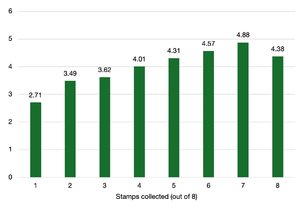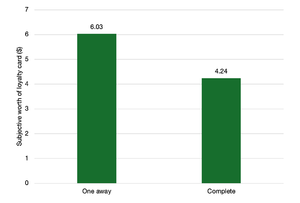Curse of Sisyphus: Difference between revisions
No edit summary |
mNo edit summary |
||
| (11 intermediate revisions by the same user not shown) | |||
| Line 1: | Line 1: | ||
[[File: | [[File:Curse of sisyphus.jpg|alt=Curse of sisyphus|thumb|'''Figure 1'''. Sisyphus pushing the boulder for eternity.]] | ||
''' | '''The Curse of Sisyphus comes from an ancient Greek tale where Zeus punished Sisyphus for cheating death twice. In the tale, Zeus punishment is that Sisyphus is cursed to roll an immense boulder up a hill only for it to roll down every time it neared the top, repeating this action for eternity''' (See '''Figure 1''')'''.''' | ||
The curse exhibits in the real world as [[The Arrival Fallacy|the arrival fallacy]] where people often think their current goal is the only destination on their path. Viktor Frankl wrote, “Happiness cannot be pursued; it must ensue, and it only does so as the unintended side effect of one’s personal dedication to a cause greater than oneself or as the by-product of one’s surrender to a person other than oneself.” Constantly pursuing pleasure and happiness is neither pleasurable nor likely to yield happiness; therefore, the best way to be happy is to forget about trying to be happy and to simply let happiness occur on its own. | |||
One key scientific proof of the curse are studies showing that there is a down regulation of pleasure as people gain more income. '''Figure 2''' illustrates this by showing findings of how much people make Vs how much people say they need, year on year<ref>''"The Overspent American" - Professor Juliet Schor, Boston University.''</ref>. The studies<ref>'''Sisyphus in business: Success, failure and the different types of failure'''. Arjan van Rooij Pages 203-223 | Published online: 14 May 2014. Accessed on 24th Sept via: <nowiki>https://www.tandfonline.com/doi/full/10.1080/00076791.2014.909808</nowiki></ref> show that other than a manager promising a bonus, the human mind itself plays tricks on itself to keep it pursuant of a goal. There are engrained [[Neurochemistry|neurochemical]] pathways which have been specifically created for this purpose.[[File:What we make vs what we say we need year on year.png|alt=What we make vs what we say we need year on year|thumb|'''Figure 2'''. What we make vs what we say we need year on year.]] | |||
== Computer games == | == Computer games == | ||
The Curse of Sisyphus is a hall mark of computer game design, to ensure gamers keep gaming, a precise gradient of goal versus rewards is designed ensuring that players feel a sense of accomplishment for their efforts which drives them to continue. | |||
== Vorfreude == | |||
The obvious answer to the Curse is to be happy with what you have, however this might cause you to stagnate. Another answer is ''Vorfreude.'' ''Vorfreude'' in German means the joy of anticipation, and a common saying is “''Vorfreude ist die schönste Freude''”, which means "the joy of anticipation is the best joy" and has been explored, scientifically as an answer to Sisyphus's curse. | |||
In one study, hundreds of volunteers were asked to participate in experiments involving loyalty cards of the kind you get in your local coffee shop. You know, the ones where you collect, say, 8 stamps and once you have filled a card with stamps you get a free coffee. What they wanted to know is when these loyalty cards were the most valuable to consumers. | |||
Economic theory dictates that rational beings should value a loyalty card with 3 stamps higher than a loyalty card with 2 stamps, etc. The most valuable loyalty card is the one with all 8 stamps because that is worth the same as a cup of coffee. But of course, if in the year 2023, you believe that people are rational and economic theory based on rational behaviour describes reality, nobody can help you anymore. You must either have lived under a rock for the last 50 years or be an economist who built his career on rational economic theory. | |||
[[File:Loyalty Stamp psychology.png|alt=Loyalty Stamp psychology|thumb|'''Figure 3.''' Loyalty Stamp psychology]] | |||
The image to the right ('''Figure 3''') shows how bad people felt when they were confronted with a situation where they collected stamps on a loyalty card but then lost the loyalty card. As you can see, there is the same progression as with '''Figure 2''', the loss hurts more the more stamps the card had, but it does not peak at a filled card with 8 (out of 8) stamps but with 7 stamps. When people had a card that was just one stamp away from a free coffee the joy of anticipation was big and losing that card hurt more than losing a card that had all 8 stamps. In a sense, when people lost a fully stamped card, they had at least the feeling of accomplishment to go on. They might not get a free coffee, but they could at least rest on the knowledge that they accomplished the task. | |||
So much for the regret of losing a loyalty card but let us turn the experiment around and assume you have a loyalty card with either 7 or 8 stamps (out of 8). Someone approaches you and offers to buy the card from you. How much money would the stranger have to pay before you would be willing to sell the loyalty card? | |||
[[File:Loyalty card psychology.png|alt=Loyalty card psychology|thumb|'''Figure 4'''. A completed loyalty card is worth less than a 90% completed loyalty card.]] | |||
The answer of the average volunteer is shown in the next chart ('''Figure 4'''). Loyalty cards that were one stamp away from being completed were more valuable to consumers than completed loyalty cards. Again, the sense of achievement when you have the completed loyalty card is something that nobody can take away from you and the card is thus less valuable to you than a card that you still must complete where you can feel the joy of anticipation of buying your last coffee to complete the card. | |||
Understanding this is extremely important if you want to improve your quality of life. If you are planning a big event like a wedding, make sure you start planning for it well ahead of time. The joy of planning everything and letting friends and family participate in the plans months before it happened will be almost as good as the actual wedding day. By thinking about the wedding, you create that joy of anticipation, and the closer you get to the wedding day, the bigger this joy will grow. Another example of this are vacations. One of the worst things you can do is spring a surprise trip on your loved one (or a surprise birthday party for that matter). You are robbing them of the joy of anticipation. Much better to sit down months in advance and start thinking about where you want to go on vacation, settling on a specific location, and then booking flights, hotels, etc. This way you actively create this joy of anticipation that will grow as the date of the vacation approaches. And (trust the research described above) if your vacation then sucks, it won’t feel as bad if you had a long time to anticipate it. | |||
=== References === | |||
Latest revision as of 03:22, 12 August 2023
The Curse of Sisyphus comes from an ancient Greek tale where Zeus punished Sisyphus for cheating death twice. In the tale, Zeus punishment is that Sisyphus is cursed to roll an immense boulder up a hill only for it to roll down every time it neared the top, repeating this action for eternity (See Figure 1).
The curse exhibits in the real world as the arrival fallacy where people often think their current goal is the only destination on their path. Viktor Frankl wrote, “Happiness cannot be pursued; it must ensue, and it only does so as the unintended side effect of one’s personal dedication to a cause greater than oneself or as the by-product of one’s surrender to a person other than oneself.” Constantly pursuing pleasure and happiness is neither pleasurable nor likely to yield happiness; therefore, the best way to be happy is to forget about trying to be happy and to simply let happiness occur on its own.
One key scientific proof of the curse are studies showing that there is a down regulation of pleasure as people gain more income. Figure 2 illustrates this by showing findings of how much people make Vs how much people say they need, year on year[1]. The studies[2] show that other than a manager promising a bonus, the human mind itself plays tricks on itself to keep it pursuant of a goal. There are engrained neurochemical pathways which have been specifically created for this purpose.
Computer games
The Curse of Sisyphus is a hall mark of computer game design, to ensure gamers keep gaming, a precise gradient of goal versus rewards is designed ensuring that players feel a sense of accomplishment for their efforts which drives them to continue.
Vorfreude
The obvious answer to the Curse is to be happy with what you have, however this might cause you to stagnate. Another answer is Vorfreude. Vorfreude in German means the joy of anticipation, and a common saying is “Vorfreude ist die schönste Freude”, which means "the joy of anticipation is the best joy" and has been explored, scientifically as an answer to Sisyphus's curse.
In one study, hundreds of volunteers were asked to participate in experiments involving loyalty cards of the kind you get in your local coffee shop. You know, the ones where you collect, say, 8 stamps and once you have filled a card with stamps you get a free coffee. What they wanted to know is when these loyalty cards were the most valuable to consumers.
Economic theory dictates that rational beings should value a loyalty card with 3 stamps higher than a loyalty card with 2 stamps, etc. The most valuable loyalty card is the one with all 8 stamps because that is worth the same as a cup of coffee. But of course, if in the year 2023, you believe that people are rational and economic theory based on rational behaviour describes reality, nobody can help you anymore. You must either have lived under a rock for the last 50 years or be an economist who built his career on rational economic theory.
The image to the right (Figure 3) shows how bad people felt when they were confronted with a situation where they collected stamps on a loyalty card but then lost the loyalty card. As you can see, there is the same progression as with Figure 2, the loss hurts more the more stamps the card had, but it does not peak at a filled card with 8 (out of 8) stamps but with 7 stamps. When people had a card that was just one stamp away from a free coffee the joy of anticipation was big and losing that card hurt more than losing a card that had all 8 stamps. In a sense, when people lost a fully stamped card, they had at least the feeling of accomplishment to go on. They might not get a free coffee, but they could at least rest on the knowledge that they accomplished the task.
So much for the regret of losing a loyalty card but let us turn the experiment around and assume you have a loyalty card with either 7 or 8 stamps (out of 8). Someone approaches you and offers to buy the card from you. How much money would the stranger have to pay before you would be willing to sell the loyalty card?
The answer of the average volunteer is shown in the next chart (Figure 4). Loyalty cards that were one stamp away from being completed were more valuable to consumers than completed loyalty cards. Again, the sense of achievement when you have the completed loyalty card is something that nobody can take away from you and the card is thus less valuable to you than a card that you still must complete where you can feel the joy of anticipation of buying your last coffee to complete the card.
Understanding this is extremely important if you want to improve your quality of life. If you are planning a big event like a wedding, make sure you start planning for it well ahead of time. The joy of planning everything and letting friends and family participate in the plans months before it happened will be almost as good as the actual wedding day. By thinking about the wedding, you create that joy of anticipation, and the closer you get to the wedding day, the bigger this joy will grow. Another example of this are vacations. One of the worst things you can do is spring a surprise trip on your loved one (or a surprise birthday party for that matter). You are robbing them of the joy of anticipation. Much better to sit down months in advance and start thinking about where you want to go on vacation, settling on a specific location, and then booking flights, hotels, etc. This way you actively create this joy of anticipation that will grow as the date of the vacation approaches. And (trust the research described above) if your vacation then sucks, it won’t feel as bad if you had a long time to anticipate it.
References
- ↑ "The Overspent American" - Professor Juliet Schor, Boston University.
- ↑ Sisyphus in business: Success, failure and the different types of failure. Arjan van Rooij Pages 203-223 | Published online: 14 May 2014. Accessed on 24th Sept via: https://www.tandfonline.com/doi/full/10.1080/00076791.2014.909808



